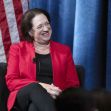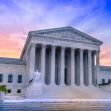While the nation continues to bemoan questionable behavior by United States Supreme Court Justices Clarence Thomas, Samuel Alito and Sonia Sotomayor, the California Supreme Court is actually doing something to prevent its judges from unethical actions.
The California Supreme Court Committee on Judicial Ethics issued a Formal Opinion on August 23 that provides new guidance on how, when, and why judicial officers should respond to invitations to celebrations by for-profit law firms that include free food and drinks and possibly gifts. The Committee’s conclusion says that accepting such invitations “could likely violate several canons in the Code of Judicial Ethics.”
Possible violations include prohibitions against “suggesting bias or that anyone has a special position of influence over the judicial officer.” Another canon prohibits “lending judicial prestige to advance a person’s pecuniary or personal interests,” and a third prohibits “accepting gifts,” with limited exceptions.
The Formal Opinion goes on to specifically define “gifts” as anything of value. It also reminds judges that they should avoid “impropriety or the appearance of impropriety,” while always acting in a “manner that promotes public confidence in the integrity and impartiality of the judiciary.”
The Opinion provides insight into the reasons for its new rule. It explains that judges are often invited to events hosted by law firms, such as holiday parties, celebrations of mergers, new office openings or significant anniversaries. It tells judges that they are “advised to consider whether any judicial canon” would be compromised by their attendance.
Factors to consider include whether attendance “will compromise public confidence in the impartiality of the judiciary.” The Judicial Ethics Committee warns that such attendance might “suggest that the law firm is in a special position to influence the judicial officer” that could “cast reasonable doubt on the judge’s capacity to act impartially.”
A retired judge, interviewed for this article, said that when he was on the bench, he never attended law-firm sponsored events. “I didn’t want to give anyone the perception that I was beholden to anyone,” he explained. “If you go to these events, everyone present including clients, staff and other lawyers, might get the impression that the game is fixed.”
In addition, this judge pointed out that many people immigrate to America from other countries where they are aware that judges often get bribed so they will issue favorable opinions. He stressed that judges in America must be careful to distinguish our country’s legal system from the ones new arrivals left behind.
The California Supreme Court’s Committee also provided practical advice for members of the judiciary. It tells judges to use the “perspective of an objective observer” to determine whether attendance “would suggest bias or special influence. It explains that in the Committee’s view, attending a law firm’s 50th anniversary party could signal a “special relationship” that would compromise the judge’s impartiality. “For this reason, the Committee advises against attending a law firm celebration…”
Judges should also understand that their mere presence might “impermissibly lend judicial prestige to advance the law firm’s interests.” Celebratory events at law firms typically have the additional aim of promoting business, so judges should recognize that these events are actually business expenses. Attending them could give the impression that the judge in attendance favors one firm over another. The opinion explains that there are exceptions, such as a memorial service for a deceased lawyer, because this would not be seen as an event promoting the law firm’s business. It would not give “a reasonable perception of an intent to gain advantage.”
The opinion also includes a section on gifts, which are defined as “anything of value to the extent that consideration of equal or greater value is not received.” Since party favors or tokens are often provided at law firm-sponsored events, judges are warned to avoid taking anything unless it is of “small or nominal dollar value” and cannot “reasonably be perceived as intended to influence the judge in the performance of judicial duties.”
With minor exceptions, the Opinion also makes it clear that “Gifts from lawyers are “inherently wrong” and have a “subtle, corruptive effect, no matter how much a particular judge may feel he is above improper influence.” Rather, gifts always carry a “perception of influence” that must be avoided.
The final element of the Opinion clarifies the “special circumstances” that might make attendance permissible. For example, attending a holiday party or retirement dinner hosted by a firm where a spouse or child is employed would be allowed because the judge would already be disqualified from presiding over cases where a party is represented by a firm that employs one of his relations.
In summary, the Supreme Court is telling California attorneys not to attend celebrations where food and beverages are served, because it might undermine impartiality or convey the impression that the firm is “in a position to influence the judicial officer’s judicial decisions.” Judges should recognize that “law firm celebrations are primarily for the purpose of business development” and are thus not exceptions to “the general prohibition against accepting gifts.”
At the end of July, the United States Senate’s Judiciary Committee voted to advance legislation to create a code of conduct for members of the Supreme Court. Called the “Supreme Court Ethics, Recusal and Transparency Act,” it passed out of Committee by a vote of 11-10 “along party lines.” At a time when confidence in the American judicial system is perhaps at an all-time low, the California Supreme Court’s Ethics Committee’s new Opinion is welcome and will hopefully provide some impetus for additional and even more rigorous ethical safeguards at all levels of our nation’s judiciary.






